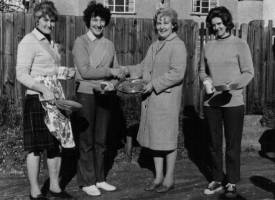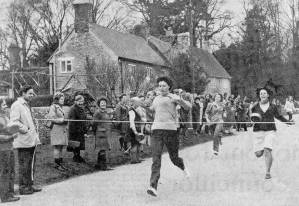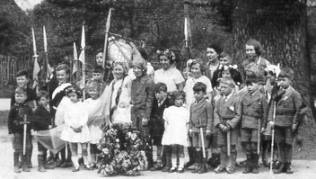
Pancakes and Celebrations
Newsletter 9. Shrove Tuesday 1998
Races, Ale and Beef Pudding
For Shrove Tuesday, we look at how the village celebrated special events. Overleaf, we examine commemoration of Royal events. Below, we look at our changing celebrations of Pancake Day.
Pancake DayFor centuries, villagers would have made their confessions on Shrove Tuesday prior to Lent, a period of penance. But by the Victorian era penance was giving way to pancakes. The historian James Blomfield (see overleaf) faithfully records that in the 1880s, Finmere church still rang the “Pancake Bell” at 11.30am. But he gloomily noted that by then its religious function had declined and it had become a signal for food:
On Shrove Tide, or Tuesday, it was usual to ring one of the Church bells to summon the people to the confession of their sins (shrive or shrift, meaning confession) preparatory to Lent. This, in later times, degenerated into a signal for preparing the pancakes, which were commonly eaten on that day.
Pancake Race Rivalry
More recently, Shrove Tuesday has been commemorated by the Women’s Institute Pancake Race. The first recorded race was in 1959. Mrs E Davies won and was presented with a copy of the WI Cookery Book by Mrs M Tredwell, WI President. The race later became a competition between north Oxfordshire villages.
In 1971, the race was held here and Finmere’s Ruby Tew won:

This photograph was taken outside the old village hall on Mere Road. It shows Mrs Kath. Sheppard (President of Finmere WI 1970/71) presenting a plate to Ruby Stanbrook (then Tew). Fringford were second, Evenley third.
The original version of this newsletter had the caption above. Claire Stanbrook and others have pointed out the recipient is Joy Stanbrook, who won the race for several years in a row. Joy passed away in 2000 while living in Delaware, U.S.A.
In 1973, Finmere lost to Bucknell for the first time in six years. The next year, the rivalry intensified and Bucknell and Finmere WIs purchased a shield to be presented to the winning village. The race that year was in Bucknell. Four villages took part: Ambrosden, Bucknell, Finmere and Stoke Lyne. The race was run over 100 yards along Bainton Road and pancakes were tossed twice. The picture below from the 1974 Bicester Advertiser shows Valerie Bennett regaining the title for Finmere.

Finmere Wins the Toss
For her win, Valerie took the new shield for Finmere and won a new frying pan for herself. Mrs Vera Pickett from Bucknell was second and Mrs Joyce Leaver of Stoke Lyne a close third.
In 1977, the race was in Finmere from the Jubilee Tree (on the junction of Valley and Mere Roads) to the school. Valerie Bennett again won. There was no race in 1978 and in 1979, Finmere preferred to hold a Pancake Party in the evening. And with that, the Pancake race tradition in Finmere ended.
A Mayday Celebration

The photograph above, provided by Wilfred Davies, shows a Mayday parade at the Cross Tree. Does anyone have any more information about it?
Royal Celebrations
Royal Coronations and Jubilees have long been a cause for celebration. For the residents of Finmere, these occasions provided opportunity for sports, dances, beef and plum pudding, and plenty of ale.
Victoria and Albert Jubilee
In 1887, there was an air of optimism in Victorian England and Finmere did not miss out:
The Jubilee was kept in the village on 15th June. By each persons in the parish being given 1lb of beef and 1 pint of Ale. The children and all old people receiving parish relief and over 70 and all widows [also] had tea … provided in the Schoolroom. “Bran pies” containing presents and sprints in the “old yard.” Most of the able bodied people and young men went to Shelswell where there were sprints and fireworks after.
Oct 19th. A tree was planted near Finmere House to commemorate the Queen’s Jubilee.
The Jubilee Tree still stands at the junction of Mere and Valley Roads.
Edward VII
Following the death of Victoria in 1901, the coronation of Edward VII was an occasion for prayer and an excuse for fun:
August 19th, 1902. This being the Coronation Day of King Edward VII and Queen Alexandra, the event was duly celebrated in the village. The fixture June 27th had to be abandoned as it was found necessary for the King to undergo a serious surgical operation before and Sunday June 29 was a day of special prayer for the King’s recovery. That recovery was so satisfactory that it was considered the King could undergo the strain of a Coronation Service at this early date.
We began our observance of the day with a special service in the Church at 11am — after that a cricket match was begun in Mr Lepper’s field — at 3.30 a dinner of Beef and Plum Pudding and ale was given to all adults and a tea to the Children in Mr Lepper’s barn — after which the health of the King and Queen was drunk with enthusiasm. Then races and sports with Prizes for the winners took place — these were followed by dancing in Mr Lepper’s barn till 11 oclock. All the children received a medal in commemoration of the event.
King George V
Edward VII did not live long and died after a series of heart attacks in 1910. Finmere residents were soon celebrating the Coronation of his son.
June 22, 1911. The Coronation of King George V and Queen May was observed as a day of rejoicing in the parish. The Church Bells were rung in the early morning and throughout the day. At midday there was a special service in the Church which was attended by almost all the Parishioners and the National Anthem was sung.
A tent was erected in Barn Meadow and at 3 all the Parish was entertained to a substantial meal, tea and ale with Cakes and strawberries and the health of the King and Queen was loyally and heartily drunk by all. A band was provided and the rest of the day was spent in games and races — prizes being given to all the winners — dancing was enjoyed by some.
Commemoration Plates were given to all the children. Those who from sickness or infirmity were unable to be present had their share of good things sent to them and the day was happily spent by all.
Does anyone still have commemoration medals or plates from the coronations?
George VI
George V died of pneumonia in 1936 and after just eleven months his eldest son, Edward VIII, abdicated. We have copies of three photographs of villagers celebrating the subsequent Coronation of George VI on 12 May 1937. We featured one picture in Newsletter 2; here is a companion photograph. Walter Aris is crouching at the front.

Blomfield’s History of Finmere.
James Charles Blomfield was Rector of Launton and Dean of Bicester. Along with his parochial duties, he studiously compiled The History of the Present Deanery of Bicester, published in seven parts between 1882 and 1894. His description of Finmere was the most detailed and was published as a separate volume in 1887. Blomfield’s History of Finmere included ten watercolour views of the village and a wealth of detail about village life. If there is sufficient interest, we will shortly republish the History of Finmere as a subscription edition, price £5. To order a copy, contact Ian and Sheila Macpherson at the Tudor House, 01280 847174.
Details of our New History of Finmere, to be published for the Millennium, will appear in a later Newsletter.